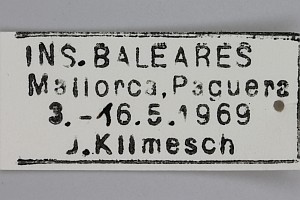

 +8Kontinente:EUAF
+8Kontinente:EUAF2. Diagnose
2.1. Geschlecht nicht bestimmt
2.2. Erstbeschreibung
3. Biologie
3.1. Nahrung der Raupe
- [Cistaceae:] Cistus monspeliensis (Montpellier-Zistrose)
Die Raupe miniert in Blättern der Montpellier-Zistrose. Stainton (1869: 226-227) meldet in der Erstbeschreibung seiner "Urodela, n.g., cisticolella, n.sp." dazu: "On the 7th March, when collecting with Monsieur Millière on the hill above the Bellevue Hotel at Cannes, I found a larva mining a leaf of Cistus monspeliensis, forming a slightly puckered blotch [...] but on the 9th I went in search of this new larva, and higher up the hill collected several of them; I also found one near the coast. On the 11th, I found the same larva on the Ile Ste.-Marguerite; I afterwards noticed it at Mentone." Weiter ist zu lesen: "It mines the leaves of Cistus monspeliensis, making an elongate blotch, which is slightly puckeresd. The upper end of the mine is free from excrement, which seems all collected at the lower end. The larva moves from leaf to leaf; and when full-fed it quits the mine, and, attaching itself to the edge of a leaf, changes there to a naked pupa, which is only attached by the tail; the head-end and the middle are entirely free from the leaf, not even fastened by a silken girth, thus reminding us of the pupa of some of the Perophoridae."
(Autor: Erwin Rennwald)
4. Weitere Informationen
4.1. Andere Kombinationen
- Butalis hibernella Staudinger, 1859 [Originalkombination]
4.2. Synonyme
- Urodela cisticolella Stainton, 1869 [S. 226, "incorrect original spelling"]
- Urodeta cisticolella Stainton, 1869 [so bei Stainton (1869: 350, 357 und 370)]
4.3. Nomenklatur
Die Art wurde als Butalis hibernella Staudinger, 1859 beschrieben. Stainton (1869: 226) beschreibt das Synonym als "Urodela, n.g., cisticolella, n.sp.". Urodela sind Schwanzlurche, doch da die Art sicher nicht zu den Scythrididae gehört, kann die Kombination mit Butalis nicht aufrecht erhalten werden. Koster & Sinev (2003: 193) nennen die Gattung Urodeta und schreiben: "Urodeta Stainton, 1869: 226; described as Urodela, an incorrect original spelling." Stainton (1869) wollte wohl tatsächlich Urodeta schreiben, jedenfalls findet sich der Name dann weiter hinten in der Arbeit (S. 350, S. 357 oben und im Verzeichnis neu beschriebener Arten S. 370).
4.4. Taxonomie
Die systematische Stellung ist unklar; das Taxon wechselte von den Elachistidae zu den Scythrididae und Momphidae und neuerdings wird es - mit Vorsicht - wieder zu den Elachistinae oder zu den Elachistidae (dann aber nicht Elachistinae!) gestellt. Wir beließen es im Lepiforum vorerst dort, wo es Koster & Sinev (2003: 194-195) besprochen hatten, bei den Momphidae - obwohl sie wohl eher die Unterbringung bei den Elachistidae befürworten würden. Da sich aus der neueren Literatur abzeichnet, dass die Zuordnung zu den Elachistinae allgemein akzeptiert wird und zudem viele Urodeta-Arten zunächst als Perittia beschrieben wurden, stellen wir die Gattung jetzt an den Beginn der Elachistinae.
4.5. Faunistik
Die Art wurde aus Chiclana im Süden von Spanien beschrieben. Nach Koster & Sinev (2003: 195) kommt sie in Europa in Spanien, Portugal und Südfrankreich vor, darüber hinaus in Marokko und Tunesien.
(Autor: Erwin Rennwald)
4.6. Literatur
- Koster, S. J. C. & S. Yu. Sinev (2003): Momphidae, Batrachedridae, Stathmopodidae, Agonoxenidae, Cosmopterigidae, Chrysopeleiidae. — In: Huemer, P., Karsholt, O. & L. Lyneborg [ed.]: Microlepidoptera of Europe 5: 1-387. Stenstrup (Apollo Books).
- Stainton, H.T. (1869): The Tineina of Southern Europe. i-viii + 1-372 + 1 pl. London (John van Voorst).
- Erstbeschreibung: Staudinger, O. (1859): Diagnose nebst kurzen Beschreibungen neuer andalusischer Lepidopteren. — Entomologische Zeitung 20 (7-9): 211-259. Stettin.













